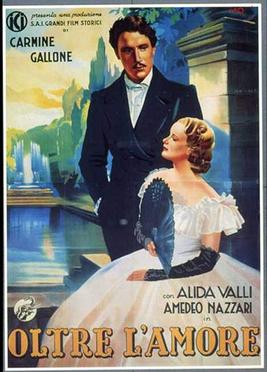Related Research Articles

Elvira Notari was an Italian film director, one of the country's early and more prolific female filmmaker. She is credited as the first woman who made over 60 feature films and about 100 shorts and documentaries, quite often writing the subjects and screenplays, inspired by Naples. The Elvira Notari Prize is named after her.
Elvira is a female given name. First recorded in medieval Spain, it is likely of Germanic (Gothic) origin.

Without a Flag is a 1951 Italian drama film directed by Lionello De Felice and starring Massimo Serato, Paolo Stoppa and Walter Rilla. It was shot at the Cinecittà Studios in Rome. The film's sets were designed by the art director Alfredo Montori.

The Musée Cantini is a museum in Marseille that has been open to the public since 1936. The museum specializes in modern art, especially paintings from the first half of the twentieth century.
Chance Operations or chance operations may refer to:
Notari is a surname. It may refer to:

Registe, also known as Women Directors, is a 2014 Italian independent film written and directed by Diana Dell'Erba.
Naples is a Song is a 1927 Italian silent film directed by Eugenio Perego and starring Leda Gys, Angelo Ferrari and Giuseppe Gherardi.
Italy Has Awakened is a 1927 Italian silent film directed by Elvira Notari and starring Eduardo Notari. The title refers to the Italian national anthem "Il Canto degli Italiani".
Soldier's Fantasy is a 1927 Italian silent film directed by Elvira Notari and starring Geppino Jovine, Eduardo Notari and Oreste Tesorone. It is preserved in the National Film Archive of Rome.
Eduardo Notari (1903–1986) was an Italian film actor of the silent era. Notari came from Naples, and most of the films he starred in were set in or around the city. His parent Elvira Notari and Nicola Notari ran the Dora Film studio. He began his career in 1912 as one of the first professional child actors in Italy.

The Ten Commandments is a 1945 Italian drama film directed by Giorgio Walter Chili. It features an ensemble of Italian actors in episodes based on the Ten Commandments.
Giuliana Bruno is a scholar of visual art and media. She is currently the Emmet Blakeney Gleason Professor of Visual and Environmental Studies at Harvard University. She is internationally known as the author of numerous influential books and articles on art, architecture, film, and visual culture.

The Castle Ball or Ball at the Castle is a 1939 Italian "white-telephones" romantic comedy film directed by Max Neufeld and starring Alida Valli, Antonio Centa and Carlo Lombardi.
I, His Father is a 1939 Italian sports drama film directed by Mario Bonnard and starring Erminio Spalla, Mariella Lotti and Clara Calamai.

Lina Mangiacapre was an Italian feminist playwright and filmmaker.

Beyond Love is a 1940 Italian historical drama film directed by Carmine Gallone and starring Alida Valli, Amedeo Nazzari and Osvaldo Valenti. It is based on the 1829 novella Vanina Vanini by Stendhal.

Lucky Night is a 1941 Italian "white-telephones" comedy film directed by Raffaello Matarazzo and starring Peppino De Filippo, Leda Gloria and Vera Bergman. It was the first film De Filippo starred in without his more famous brother Eduardo De Filippo.

Giulia Cassini Rizzotto was an Italian actress and film director, kindergarten teacher, novelist, translator and writer. She appeared in many films in Italy including Malombra (1917) and Fabiola (1918).

The history of cinema in Naples begins at the end of the 19th century and over time it has recorded cinematographic works, production houses and notable filmmakers. Over the decades, the Neapolitan capital has also been used as a film set for many works, over 600 according to the Internet Movie Database, the first of which would be Panorama of Naples Harbor from 1901.
References
- 1 2 "Notari, Elvira". Treccani.it. Retrieved 5 May 2016.
- ↑ Cantini p.19